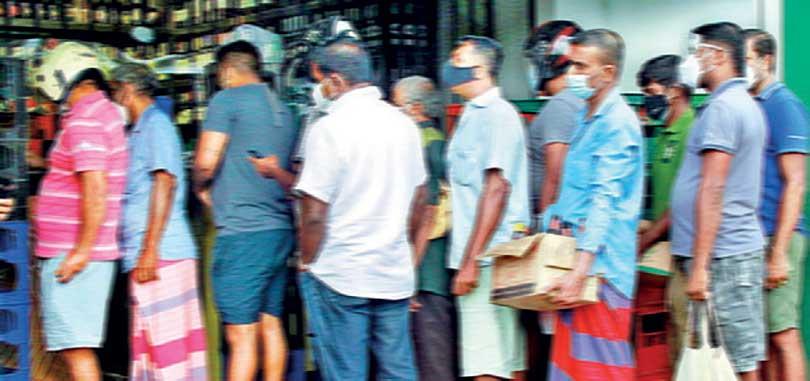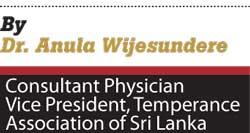05 Oct 2021 - {{hitsCtrl.values.hits}}
 Queues such as this one were a common sight after news broke of the opening of liquor stores
Queues such as this one were a common sight after news broke of the opening of liquor stores
 Alcohol dependence is a major health and social problem in Sri Lanka. Most medical and social workers are aware of this grave situation. Unfortunately, very few boldly voice their concern regarding this terrible but preventable tragedy which has destroyed thousands of our countrymen, often in the prime of their lives. The magnitude of this malady was brought into public focus in Sri Lanka with the emergence of the Covid pandemic, since March 2020.
Alcohol dependence is a major health and social problem in Sri Lanka. Most medical and social workers are aware of this grave situation. Unfortunately, very few boldly voice their concern regarding this terrible but preventable tragedy which has destroyed thousands of our countrymen, often in the prime of their lives. The magnitude of this malady was brought into public focus in Sri Lanka with the emergence of the Covid pandemic, since March 2020.
Readers will recall that during the first Covid wave of March 2020, with the lifting of the island wide quarantine curfew which lasted till early June 2020, the supermarkets opened, but bars remained closed, as advised by the medical profession. With the end of the lockdown, we witnessed two queues outside most supermarkets. The longer queue had only men in search of booze to quench their unquenchable thirst for firewater, while the other queue comprised of the sensible women buying food stuff. It was indeed another common but sad sight to see many women queuing outside pawn shops, selling their meager family jewelry to keep the home fires burning, while the men thought it fit to squander away their dwindling income or the dole obtained during the first Covid pandemic on alcohol.
During the second Covid wave of October 2020, which resulted from the Minuwangoda/ Peliyagoda cluster,the bars remained closed during the district based lockdown .The third Covid wave, which resulted from the New Year cluster in April 2021; was superseded by the dangerous Delta variant around June - July 2021. The resultant initial district wise lockdown again led to the closure of bars. During this period, on line sale of alcohol began. This was derailed within a short period due to the strong objections raised by the Sri Lanka Medical Association to the Minister of Finance.However, the Ministry of Finance should have been aware that the National Authority on Tobacco and Alcohol Act (NATA) No. 26 of 2006 prohibits alcohol advertising on the internet. Furthermore, internet sales will also circumvent the age, time and place restrictions mandated for alcohol sales in the country, through the Excise Ordinance and the NATA Act.
As the consequences of the Delta wave raged island-wide, with increased hospital admissions, deaths and fatigue of the overburdened health sector, an island-wide quarantine lockdown was introduced again on 20th August. This led to the closure of all liquor outlets, which were suddenly opened on 17th September, during the lockdown period.
No sooner, the news broke of the opening of the liquor outlets; thousands of men thronged the bars like bees to a beehive. They jostled and shoved against each other to obtain the alcohol in such a frenzy, with scant respect to health guidelines in the middle of a major pandemic. If an alcohol addict wishes to drink to death, it is certainly his choice. He may certainly do so with a brain warped by the toxic effects of alcohol. In some instances, the long-suffering and battered wives and children will probably breathe sighs of relief! However, in the middle of a global pandemic especially Sri Lanka having been in the middle of a severe Delta wave infection, this disgusting behaviour would have certainly enhanced the spread of Covid.
People were seen in the electronic, print and social media, carrying bottles of alcohol tucked away in their half folded sarongs, under their armpits and around their necks.The affluent were seen piling cases of alcohol in the car boots! After pushing and jostling the shoveling against each other, they would have spent all the money to buy the deadly drink, at the expense of the poor family desperate for better meals during these difficult times. Furthermore, in the mayhem of jostling against each other, they would have probably transported the Covid-19 virus home and infected the helpless family. We would know of the outcome if there is another surge of Covid-19, in another two week time period.
Despite the rush witnessed outside most liquor sales outlets on Friday,
September 17th, the police were conspicuously absent. Precautions should have been taken by the bar owners, the police informed and the unruly and dangerous behaviour stopped immediately. However a few days later the police officers were seen dispersing a small group of pavement sellers who protested peacefully against opening of liquor outlets, while they were prohibited from commencing their small time pavement businesses simultaneously.
The Excise Department and the distillery companies invariably claim illicit alcohol sales to justify opening of liquor outlets during the quarantine curfew. However, it must be realized that the primary duty of the Excise Department is to enforce the laws related to illicit alcohol in Sri Lanka. This should be achieved by actively searching, discovering and destroying the illicit dens and prosecuting the perpetrators rather than encouraging online sales of alcohol and opening bars during lockdowns.
It is very likely that the government, desperate to fill the empty state coffers and overcome the current debt trap, suddenly decided to open liquor sales outlets to improve revenue collections. However, it must be stressed that the government continues to lose billions annually due to inadequate taxation from alcohol and tobacco industries and poor excise fine collections.
The following suggestions if implemented would certainly help to improve revenue collections from sale of alcohol in Sri Lanka.
Immediately stop all tax concessions and favours granted to the alcohol industry.
Review the taxation of alcohol in every annual budget and increase the taxation according to the cost of living and other relevant parametres.
Activate the Excise Department to conduct more raids and destroying of illicit alcohol dens and increase excise fine collections.
Investigate the accusation made by Mr. Buddhika Pathirana in Parliament regarding officers of the Excise Department & Ministry of Finance who caused a 1 billion rupee loss to the government coffers annually by awarding a contract for printing stickers or bar codes displayed on liquor bottles to an Indian company (The Island of 21st April 2021).
Reclaim 80 billion rupee tax from artificial toddy makers which has been deprived to the state coffers annually for many years. This has resulted from officers of the Excise Department giving technical points to the artificial toddy makers in order to evade taxes which should have rightly been paid to the state. This information awas also tabled in Parliament by Mr. Buddhika Pathirana who emphasized the need to amend the outdated Excise Ordinance to overcome the loopholes which are capitalized upon by some corrupt officers of the Exercise Department for their own benefit and deprive the state coffers of this valuable tax income (The Island of 5th May 2021).
In conclusion, I would like to emphasize the magnitude of the problem of alcohol dependence in Sri Lanka with the following statistics
1. Annually, around 18000 men die in Sri Lanka from alcohol related deaths
2. Around 40% of Sri Lankan males consume alcohol
3. Low income families spend 1/3 of their income on alcohol
4. Per capita consumption of alcohol in Sri Lanka is 3.5 litres. This is the highest among SAARC countries.
5. Per capita consumption among males alone is 18.9 litres
6. Government health expenditure on diseases related to alcohol consumption is Rs. 140 billion annually.
Source: Chairman’s report National Alcohol & Tobacco Authority 2017 and WHO Global Report 2018
The problem of alcoholism in Sri Lanka is manifested in the following,
Rising incidence of hospital admissions due to alcohol related diseases - cirrhosis, pancreatitis, non-communicable diseases, variety of psychiatric disorders including depression and suicide.
The rising incidence of road traffic accidents, crime, homicide and violence.
Rising incidence of sexual abuse of women and children, especially in rural areas with deterioration of moral and social values
For any programme designed to control alcoholism in Sri Lanka to be sustainable and effective, it is essential to mobilize all stakeholders involved in alcohol control to work as a multitask team. This team would include the National Alcohol and Tobacco Authority, Excise Department, police, religious dignitaries, voluntary societies , NGOs, medical and social support groups and concerned public. We could then save our countrymen from the scourge of alcohol dependence.
26 Apr 2024 2 hours ago
26 Apr 2024 2 hours ago
25 Apr 2024 4 hours ago
25 Apr 2024 5 hours ago
25 Apr 2024 5 hours ago